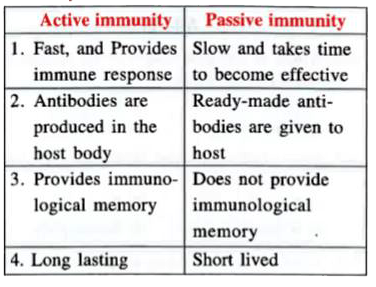Define immunity. Describe different ways to develop immunity. Write two differences between active and passive immunity.
Step-by-Step Text Solution:
Step 1: Define Immunity
Immunity is the state of protection from infectious diseases. It refers to the physiological functions of the immune system, which defends the body against infectious microbes. More specifically, immunity can be defined as a reaction to foreign substances, including microbes and macromolecules such as proteins and polysaccharides.
Step 2: Describe Different Ways to Develop Immunity
There are two primary types of immunity:
1. Innate Immunity: This type of immunity provides protection against infections through mechanisms that are already present in the body before any exposure to pathogens. It includes physical barriers (like skin), phagocytic cells (such as neutrophils and macrophages), and other components that act immediately or within hours of an antigen's appearance in the body. Innate immunity is also referred to as natural or native immunity.
2. Adaptive Immunity: This immunity develops as a response to specific infections. It is capable of recognizing and selectively eliminating specific foreign microorganisms and molecules. Adaptive immunity improves over time and provides long-lasting protection. For example, once a person has had chickenpox, their body develops a memory of the virus, making them less likely to contract it again. This type of immunity is sometimes called acquired immunity.
Step 3: Differences Between Active and Passive Immunity
1. Exposure to Antigen:
- Active Immunity: Requires exposure to a pathogen or the antigen of a pathogen for the immune system to respond and develop immunity.
- Passive Immunity: Does not require exposure to an infectious agent; instead, it involves the transfer of antibodies from another source.
2. Immune System Involvement:
- Active Immunity: The immune system of the individual is actively involved in the process of developing immunity.
- Passive Immunity: The immune system is not actively involved; instead, it receives antibodies from another individual or organism.
Immunity is the state of protection from infectious diseases. It refers to the physiological functions of the immune system, which defends the body against infectious microbes. More specifically, immunity can be defined as a reaction to foreign substances, including microbes and macromolecules such as proteins and polysaccharides.
There are two primary types of immunity:
1. Innate Immunity: This type of immunity provides protection against infections through mechanisms that are already present in the body before any exposure to pathogens. It includes physical barriers (like skin), phagocytic cells (such as neutrophils and macrophages), and other components that act immediately or within hours of an antigen's appearance in the body. Innate immunity is also referred to as natural or native immunity.
1. Exposure to Antigen:
- Active Immunity: Requires exposure to a pathogen or the antigen of a pathogen for the immune system to respond and develop immunity.
- Passive Immunity: Does not require exposure to an infectious agent; instead, it involves the transfer of antibodies from another source.
- Active Immunity: The immune system of the individual is actively involved in the process of developing immunity.
- Passive Immunity: The immune system is not actively involved; instead, it receives antibodies from another individual or organism.
Topper's Solved these Questions
- HUMAN HEALTH AND DISEASE BOOK - ICSECHAPTER - HUMAN HEALTH AND DISEASE EXERCISE - PREVIOUS YEARS. BOARD PAPER QUESTIONS (Very Short Answer Type Questions)
23 Videos
- HUMAN HEALTH AND DISEASE BOOK - ICSECHAPTER - HUMAN HEALTH AND DISEASE EXERCISE - PREVIOUS YEARS. BOARD PAPER QUESTIONS (Short Answer Type-I Questions)
18 Videos
- HUMAN HEALTH AND DISEASE BOOK - ICSECHAPTER - HUMAN HEALTH AND DISEASE EXERCISE - PRACTICE QUESTIONS (Short Answer Type-II Questions)
39 Videos
- EVOLUTIONBOOK - ICSECHAPTER - EVOLUTIONEXERCISE - COMPETITION CORNER (Assertion and Reason Type Questions (For AIIMS aspirants))
26 Videos
- HUMAN REPRODUCTIONBOOK - ICSECHAPTER - HUMAN REPRODUCTIONEXERCISE - SOURCE BASED QUESTIONS
22 Videos
Similar Questions
Differentiate between active immunity and passive immunity.
View SolutionDifferentiate between active immunity and passive immunity.
View SolutionActive immunity is due to
View SolutionActive immunity is due to
View SolutionWhich of the following is not a correct difference between active immunity and passive immunity

View SolutionGive four significant differences between active and passive absorption of water in plants.
View SolutionMention one significant difference between active acquired immunity and passive acquired immunity.
View SolutionActive immunity means
View SolutionActive immunity means
View SolutionGive one significant difference between the following: Active immunity and Passive immunity
View Solution
